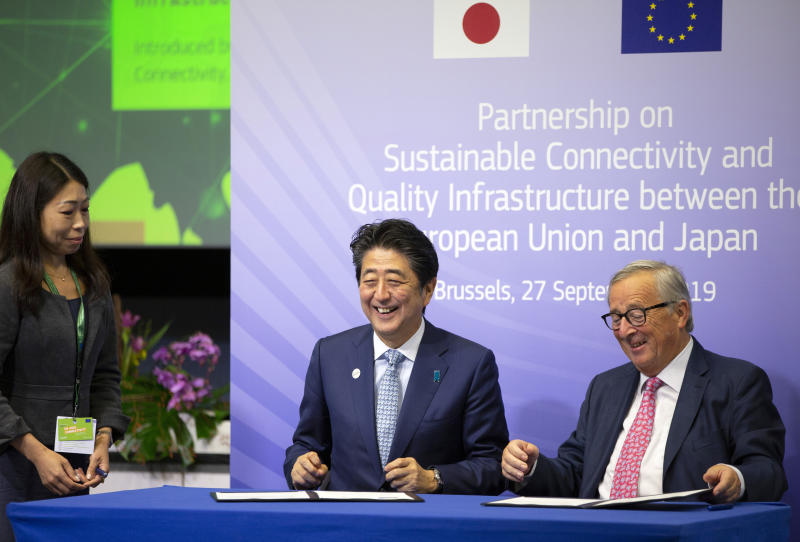In counterweight to China, EU and Japan sign deal to link Europe and Asia
Sign up now: Get ST's newsletters delivered to your inbox

Japan's Prime Minister Shinzo Abe and European Commission President Jean-Claude Juncker during a signing ceremony at an EU-Asia Connectivity conference in Brussel on Sept 27, 2019.
PHOTO: AP
Follow topic:
BRUSSELS (REUTERS) - The European Union and Japan signed an infrastructure deal on Friday (Sept 27) to coordinate transport, energy and digital projects linking Europe and Asia, seeking an alternative to Chinese largesse that has raised suspicions in Brussels and Tokyo.
The accord, signed by Japanese Prime Minister Shinzo Abe and European Commission President Jean-Claude Juncker, formalises Japan's involvement in a new EU-Asia connectivity plan that is set to be backed by a €60 billion (S$91 billion) EU guarantee fund, development banks and private investors.
"Whether it be a single road or a single port, when the EU and Japan undertake something, we are able to build sustainable, rules-based connectivity from the Indo-Pacific to the Western Balkans and Africa," Mr Abe told an EU-Asia forum in Brussels.
Since 2013, China has launched construction projects across more than 60 countries, known as the Belt and Road Initiative, seeking a network of land and sea links with South-east Asia, Central Asia, the Middle East, Europe and Africa.
"The sea route that leads to the Mediterranean and the Atlantic must be open," Mr Abe added, referring to the need to prevent projects funded by Beijing and its vast foreign exchange reserves dominating transport routes.
Mr Juncker also vowed to help build infrastructure "without mountains of debt" or a reliance "on a single country".
That was a veiled reference to Chinese-financed projects that have sent debts in some central Asian and Balkan countries soaring after they embarked on building bridges, roads and tunnels they could ill-afford.
The EU and Japan also want stricter environmental standards.
EU officials said they are concerned about what they see as a Chinese investment model which lends to countries for projects they may not need, making them reliant on China once under way.
Poor countries across Asia and Africa have seized on the attractive Chinese loans.
A Chinese-funded highway to link Montenegro's Adriatic coast to landlocked neighbour Serbia has so indebted Montenegro that the International Monetary Fund has told the country it cannot afford to finish the project.
Although not all European and Japanese money will be spent in Asia, the commission's strategy makes spending on infrastructure links with Asia official EU policy involving the EU's common budget.
In their 10-point accord, the EU and Japan promised to pay utmost attention to countries' fiscal capacity and debt sustainability.

